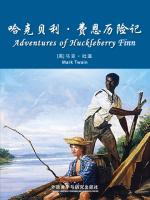Reflections on “The Adventures of Huckleberry Finn”
阿白
In the realm of American literature, few works have captured the essence
of youth, adventure, and societal critique as vividly as Mark Twain's
"The Adventures of Huckleberry Finn." This timeless classic,
first published in 1884, weaves a tale that is both whimsical and
profoundly thought-provoking, offering a glimpse into the American
frontier through the eyes of its protagonist, a young boy named Huck
Finn. As I delved into the pages of this novel, I was not merely
transported to a world of rivers, rafts, and mischief; I was also
confronted with complex themes of race, morality, and the innate human
desire for freedom. My journey through Twain's narrative was one of
laughter, contemplation, and a deepened understanding of the
complexities inherent in human nature. The story begins with Huck
living a rather unremarkable life in the fictional town of St.
Petersburg, Missouri, under the thumb of his abusive and morally rigid
father, Pap Finn. Huck's life takes a dramatic turn when he discovers
that his father has returned, threatening to ensnare him in a life of
poverty and neglect. Seeking escape, Huck falsely claims that his own
death is imminent, thus securing a temporary reprieve by convincing Tom
Sawyer's aunt, Miss Watson, to take him in. However, Huck's comfort is
short-lived; he soon finds himself caught between the constraints of
civilized society and the freedom he craves. This internal conflict sets
the stage for the central adventure of the novel – Huck's journey down
the Mississippi River with a runaway slave named Jim. Huck and Jim's
voyage serves as the backbone of the narrative, offering a vivid
portrayal of the American landscape and the people who populate it. The
river becomes a symbol of both escape and exploration, a realm where
Huck can temporarily shed the shackles of societal norms and
expectations. The natural world, with its unpredictable currents and
untamed beauty, contrasts sharply with the structured, often oppressive,
environment of St. Petersburg. Twain's descriptions of the river and its
surroundings are not merely picturesque; they are alive with sensory
detail, inviting readers to breathe in the scent of the water, feel the
sun on their skin, and hear the echoes of distant trains and wildlife.
As Huck and Jim's journey unfolds, the novel delves into the contentious
issue of slavery, challenging readers to confront their own biases and
moral beliefs. Huck's relationship with Jim evolves from one of initial
discomfort and prejudice to a profound bond of friendship and mutual
respect. Huck's internal struggle with the moral imperative to turn Jim
in, as dictated by the law of the time, versus his burgeoning sense of
empathy and fairness, is a testament to Twain's mastery of character
development and thematic exploration. Huck's journey is, in essence, a
moral odyssey, one that forces him to grapple with the contradictions
between what he is told is right and what his own conscience tells him
is just. Twain's portrayal of Jim is particularly nuanced and ahead of
its time. In a society that often dehumanized slaves, Jim emerges as a
complex and multifaceted character, characterized by his wisdom,
kindness, and resilience. Jim's narratives of his life, filled with
tales of his family, dreams, and hopes for freedom, humanize him and
underscore the injustice of slavery. Through Huck's evolving perception
of Jim, Twain underscores the absurdity of racial hierarchy and the
humanity shared by all individuals, regardless of their skin color. One
of the most memorable aspects of "Huckleberry Finn" is Twain's
use of vernacular language, particularly in Huck's dialogue. The novel
is replete with colloquialisms, slang, and dialect, which not only lend
authenticity to the characters but also challenge the conventional norms
of literary expression. Huck's voice, raw and unfiltered, speaks
directly to the reader, creating a sense of intimacy and immediacy that
draws one deeper into the narrative. This linguistic approach, while
innovative, was also controversial in its time, as it defied the formal,
refined language expected in literary works. Twain's decision to embrace
and celebrate the spoken language of the common folk underscores his
commitment to portraying the lived experiences of everyday Americans.
Moreover, "Huckleberry Finn" serves as a commentary on the
hypocrisy and absurdity of societal norms and institutions. The novel
mocks the hollow piety of the 'civilized' world, where people like the
Grangerfords and the Shepherdsons engage in violent feuds over trivial
matters while professing religious devotion. Conversely, Huck and Jim,
often dismissed as societal outliers, exhibit qualities of compassion,
bravery, and integrity that are notably absent in the more 'respectable'
characters. Twain's satire is both sharp and subtle, pointing out the
inconsistencies and contradictions that underpin American society. The
novel's conclusion, with Huck deciding to reject the comforts of a
settled life and instead head off into the unknown, symbolizes the
enduring appeal of freedom and the individual's quest for
self-determination. Huck's choice reflects a deep-seated desire for
authenticity and independence, a theme that resonates with readers
across generations. It is a poignant reminder that true freedom is not
merely an absence of external constraints but a state of mind, a
willingness to live true to one's own values and desires. In
conclusion, "The Adventures of Huckleberry Finn" is a
masterpiece that transcends its historical context, offering a rich
tapestry of themes and ideas that continue to resonate in contemporary
society. Twain's prose is both lyrical and incisive, his characters
vividly drawn and deeply relatable. The novel is a celebration of
friendship, a critique of societal hypocrisy, and a profound exploration
of morality and identity. As Huck embarks on his journey down the
Mississippi, so too do readers embark on a voyage of self-discovery,
confronted with questions about race, freedom, and the essence of what
it means to be human. "Huckleberry Finn" is not merely a book
to be read; it is an experience to be lived, a journey that stays with
you long after the final page has been turned.



 京公网安备 11010802032529号
京公网安备 11010802032529号